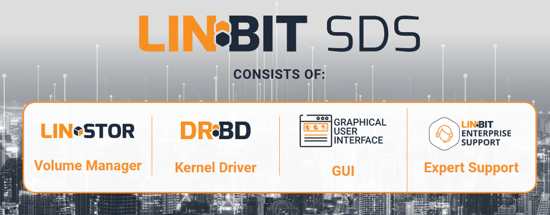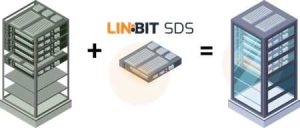Linbit SDS V.2.0 Software-Defined Storage Solution for Linux Platforms
Featuring GUI and support for AWS’ EBS volumes, improved performance, scalability, and hyper-converged data locality, and integration with AWS by supporting management of EBS volumes
This is a Press Release edited by StorageNewsletter.com on October 24, 2022 at 2:01 pmLinbit SDS 2.0 from Linbit solutions GmbH is a SDSe solution for Linux platforms available in flavors for Kubernetes, Red Hat OpenShift, Apache CloudStack, OpenStack, OpenNebula, Hashicorp’s Nomad, Proxmox VE, XCP-ng, and as a virtual appliance for VMWare.
It provides block storage virtualization with a focus on performance, scalability, hyper-converged data-locality for high I/O performance, and resiliency through data replication.
Target use cases
These features make SDS 2.0 a solution for finance and insurance industries, as they need to meet regulatory compliance. SDS 2.0 also enables these institutions to prosper under cost pressure because it provides a single SDS platform that they can use for multiple workload orchestrators. All data intense environments across many industries – which require extreme levels of data resiliency – benefit from the improved solution.
As SDS 2.0 is deeply rooted in the Linux environment, it is a fit for cloud builders, who often have a strong Linux affinity. It is also a fit for public and private cloud providers. IaaS, DBaaS, Paas, and SaaS and all their variants rely on resilient storage, among other pillars. For example, the company’s technologies form the backbone of the world’s largest cloud provider’s DBaaS offering.
Enterprises task system integrators with migrating legacy applications into cloud environments. Often, it is necessary to find a replacement for highly available shared storage appliances in the new environment. Storage replication is a key strength of SDS 2.0 and with that a perfect fit for the task.
Modern applications often built with a micro services architecture, also called cloud native applications, require data at some point. Keeping the precious data in the same cluster, whether in an unstructured form (files) or structured (databases) is an advantage. SDS 2.0 addresses these requirements with its Kubernetes integration.
Highlights of V.2.0 include:
- GUI in addition to the CLI and the restful API
- Integration with Amazon AWS by supporting the management of EBS volumes. The prime use case is databases replicated over multiple availability zones on AWS
- Integrated snapshotting, backup (full and incremental), and snapshot-delta shipping between independent clusters for DR purposes (including a scheduler)
- Optional RDMA storage networking instead of TCP/IP over Ethernet
- Support for storage networking in the overlay/container network in Kubernetes environments, in addition to storage networking in the underlay/host network
- Encryption at rest with self-encrypting drives (SEDs) in addition to dm-crypt
- Data plane improvements: reduced write latency, improved handling of thinly provisioned back-end storage, reduced contention during rebuilding processes
These features join Linbit SDS’s already capabilities.
Background
Linbit SDS product flavors are support subscriptions available with different SLAs from the company. They contain access to regularly updated software repositories and support from the firm’s Team. The software contains open source components, which are mainly sponsored by the company and commercial components that are available only to customers.















 Subscribe to our free daily newsletter
Subscribe to our free daily newsletter

